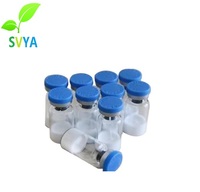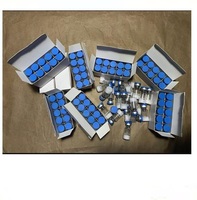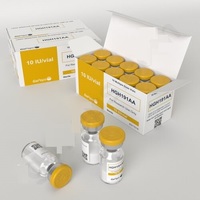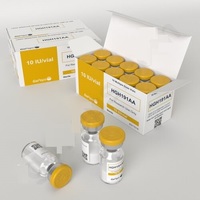Somatropin 10iu HGH 191AA / hgh human growth skype:alice.zhang595
Product Quick Detail
- FOB Price
- USD $10.50 / Piece
- Minimum Order
- 10
- Place Of Origin
- China
- Packaging
- 10iu/vial 10vials/box
- Delivery
- 5 Days
Specifications
HGH 191AA CAS 12629-01-5
hgh191aa is a hormone that is naturally produced by the body. It really is synthesized and secreted by skin cells in the anterior pituitary gland located at the bottom of the brain.
hgh191aa stimulates many metabolic processes in cells. hgh191aa impacts protein, fat, carbohydrate and mineral metabolism. The major role of HGH is to stimulate the liver to secrete Insulin-like
Growth Factor-I (IGF-I). IGF-I stimulates production of cartilage cells, resulting in bone growth and also plays a key role in muscle protein synthesis and organ growth.
Feature:
hgh191aa treatment is widely used for both pediatric and adult GHD. It works to return growth hormone levels to those of a non-growth-hormone-deficient individual. In children, hgh191aa can
increase growth rate and promote the development of muscle. In adults, it can build muscle, increase energy, and reduce body fat. However, hgh191aa cannot promote growth in post-pubescent
individuals. After puberty, the ends of long bones fuse and quit growing.
| Item | Specification |
| Product Name | HGH |
| Synonyms | Somatoropin |
| Appearance | White Powder |
| CAS NO | 12629-01-5 |
| Purity | >99% |
| Assay | HPLC 99% |
| Molecular Formula | C990H1529N263O299S7 |
| Molecular Weight | 22125D |
| Specification | 3iu/vial,7iu/vial, 10iu/vial,10vials/box |
| Transport Package | Foil Bag or Vial |
| Certification | GMP, HSE, ISO 9001, USP |
| HS Code | 3001200010 |
Peptide synthesis
In organic chemistry, peptide synthesis is the production of peptides, which are organic compounds in which multiple amino acids are linked via amide bonds, also known as peptide bonds.
Peptides can be chemically synthesized by coupling the carboxyl group of one amino acid to the amino group of another amino acid molecule.
- Country: China (Mainland)
- Business Type:
- Market:
- Founded Year:
- Address:
- Contact:Richelle Zhang











